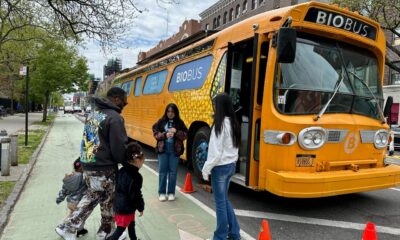Questions of the Day Program
NYU’s Prof. Wei Ji Ma explains why the human side of science needs to be part of the conversation
Fanuel Muindi conducts an in-person interview in New York City with Dr. Wei Ji Ma who is a Professor of Neural Science and Psychology at NYU. His lab studies decision-making in planning, social cognition, working memory, and perception. In addition to his scientific research, he is a founding member of the Scientist Action and Advocacy Network and of NeuWrite NYU. Dr. Ma co-founded and leads the Growing up in Science (GUIS) in which scientists share their “unofficial stories”. In the interview, Dr. Ma discusses the theory of change behind GUIS and emphasizes the importance of public engagement in science, advocating for breaking down the barriers between academia and society. He also stresses that scientists should not only communicate their research but also share their personal stories to make science more relatable and build trust with the public. Dr. Ma believes that introducing scientists to broader audiences can help demystify the profession, making it clear that science is a human endeavor shaped by personal challenges and decisions. He notes that the initiative could also inspire bi-directional engagement, where scientists learn from the public and are motivated by community-driven concerns.
https://growingupinscience.github.io/
Conversation Analysis
What to Know That’s Actionable:
“Growing Up in Science” (GUIS) provides an important tool for fostering mentorship and belonging by allowing faculty to share personal, candid stories about their scientific journeys. This transparency can help students, particularly from underrepresented groups, feel more connected to academia. Scaling this initiative across institutions will require capacity building, including structured support for organizers. Offering stipends or fellowships could help expand the program, especially in underserved communities. Additionally, the challenge of doing long-term evaluation is a gap that needs to be addressed for such initiatives.
The Big Picture:
GUIS plays a vital role in humanizing science by shifting the focus from just talking about the science to including the personal struggles and triumphs of scientists whilst doing the science. This reflects a broader set of initiatives that are attempting to make the scientific community more relatable and inclusive, bridging the gap between scientists and the public. The initiative also emphasizes the growing importance of public engagement in academia, aligning with broader trends to integrate such activities into graduate education. However, institutionalizing these practices remains a challenge, especially as public engagement efforts are still not fully recognized in academic promotion and tenure processes.
Open Questions for Taking Action:
A key question remains on how to effectively measure the long-term success of initiatives like GUIS. As noted before, systematic data collection is difficult without the accompanying funding necessary to do it properly. Additionally, there is a need to consider what institutional support is required to scale this model to other universities, especially those with fewer resources. Another open question is how public engagement, particularly through storytelling, can evolve beyond academic settings to reach underserved communities. Partnerships with K-12 schools, nonprofits, or local governments could offer pathways to broaden GUIS’s reach and influence.
The Bottom Line:
GUIS and other similar initiatives represent an important aspect of how scientists engage with the public, emphasizing personal narratives to make science more relatable and inclusive. Formalizing these efforts within science will be crucial for their long-term success.
Fanuel Muindi is a former neuroscientist turned civic science ethnographer. He is a professor of the practice in the Department of Communication Studies within the College of Arts, Media, and Design at Northeastern University, where he leads the Civic Science Media Lab. Dr. Muindi received his Bachelor’s degree in Biology and PhD in Organismal Biology from Morehouse College and Stanford University, respectively. He completed his postdoctoral training at MIT.

-
 Audio Studio1 month ago
Audio Studio1 month ago“Reading it opened up a whole new world.” Kim Steele on building her company ‘Documentaries Don’t Work’
-
Civic Science Observer1 week ago
‘Science policy’ Google searches spiked in 2025. What does that mean?
-
Civic Science Observer1 month ago
Our developing civic science photojournalism experiment: Photos from 2025
-
Civic Science Observer1 month ago
Together again: Day 1 of the 2025 ASTC conference in black and white
Contact
Menu
Designed with WordPress
























